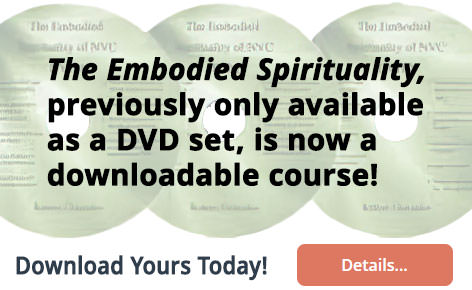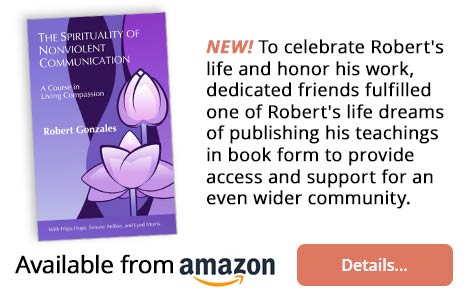

Welcome to the Robert Gonzales Training Legacy. Here you can learn more about Robert and the powerful teachings he dedicated his life to. NVC Academy is proud to house and share with you the complete body of his life's work. We invite you to explore, learn, and help keep his legacy alive!
Robert's passion was in the spirituality of the Nonviolent Communication (NVC) process. He saw NVC both as a process that helps people connect more authentically with themselves and others, and as a spiritual practice and way of living. The worldwide NVC community mourned when Robert died in 2021. He left behind a legacy of work that emerged from a lifetime of inquiry into the intersection between spirituality and human communication. More about Robert.
Jeff shows us how to emply NVC to supercharge the possibility of transformation between two people in a mediation process.
Details...Article
2 - 3 minutes
If we are in the dominant group, intervening to prevent violence or an "ouch" is a way to ally with marginalized folks. We can intervene to meet their needs, rather than our own. In other words, we can intervene without putting our experience at center stage. To that end, here are six ways to ask if an intervention is welcome.
Details...Audio
40 minutes
Ingrid shares about the three primary keys of parenting & NVC, two child rearing models, developmental needs for children and how to foster secure attachment.
Details...Audio
21 minutes
Veteran CNVC Certified Trainer Sylvia Haskvitz explores the phases of Knowing, Living and Teaching NVC.
Details...CNVC Certified Trainer Lore Baur shares how, as a teacher, the classroom is a laboratory for learning NVC and incorporating the NVC consciousness into the classroom. Topics discussed include empathy, permission to educate, protective use of force, corrective action, choice & options and re-do.
Details...Article
3-5 minutes
Effective and connected dialogue requires significant self-awareness, mindfulness, and skill. You can focus on any of these six areas that most often escape your awareness: anchoring and staying grounded; boundaries; thoughts and beliefs; stuckness or attachment; feelings and needs; and requests. Read on for a list of questions to help you focus on how to do that.
Details...Article
5 - 7 minutes
A big part of why receiving feedback is so challenging is because so few people around us know how to give feedback untainted with criticism, judgment, or our personal upset. But, if we wait for others to offer us usable, digestible, manageable feedback, we will not likely receive sufficient feedback for our growth and learning. Instead, we can grow in our capacity to fish the pearl that’s buried within. Here are three specific suggestions for how.
Details...Article
4 - 6 minutes
With coaching or counselling clients, their resistance can show up as “bracing against” something. But if we push back against their resistance, we miss noticing what they're protecting or embracing. By going into resistance clients build awareness and often shift when they get clear about their underlying needs, and new choices. Some clients don’t shift even after we’ve tried everything. In that case, read on to learn about Frank Farrelly's "provocative therapy".
Details...Learn tools to help you reconnect and repair your relationship with your adult children. Whether the issues are estrangement, lack of trust, conflict, dependence, miscommunication or any other challenge that impacts you with your grown sons and daughters, your heart will find comfort and ease through this course.
Details...Article
7 - 11 minutes
In general, criticism is a reactive response discomfort. When someone criticizes, they are not yet able or willing take responsibility for their needs. All criticism is a tragic expression of feelings and unmet needs. When you meet that criticism skillfully you not only care for yourself, you can facilitate clarity, and constructive communication, about what the other person is truly asking for.
Details...

